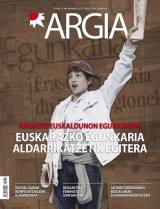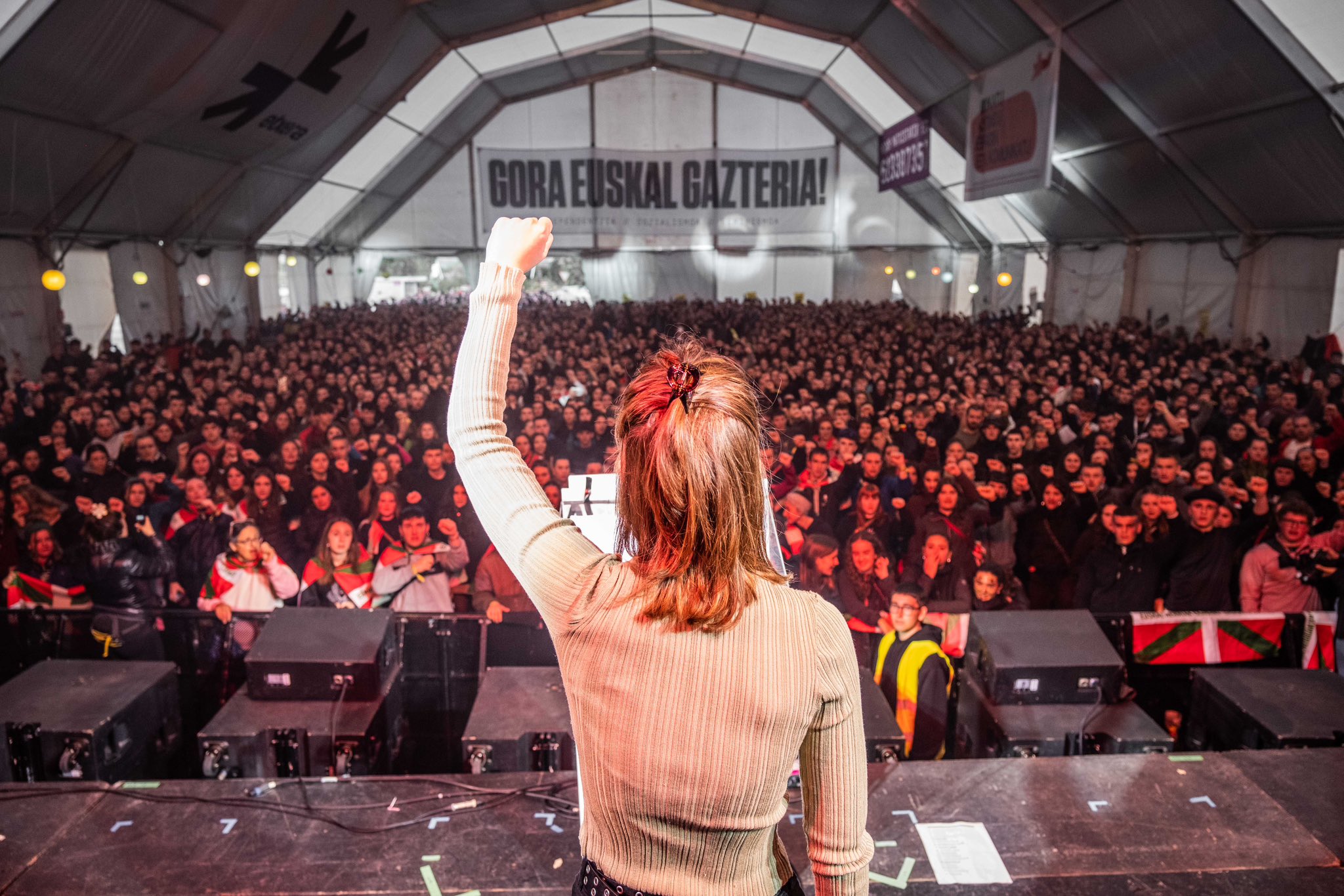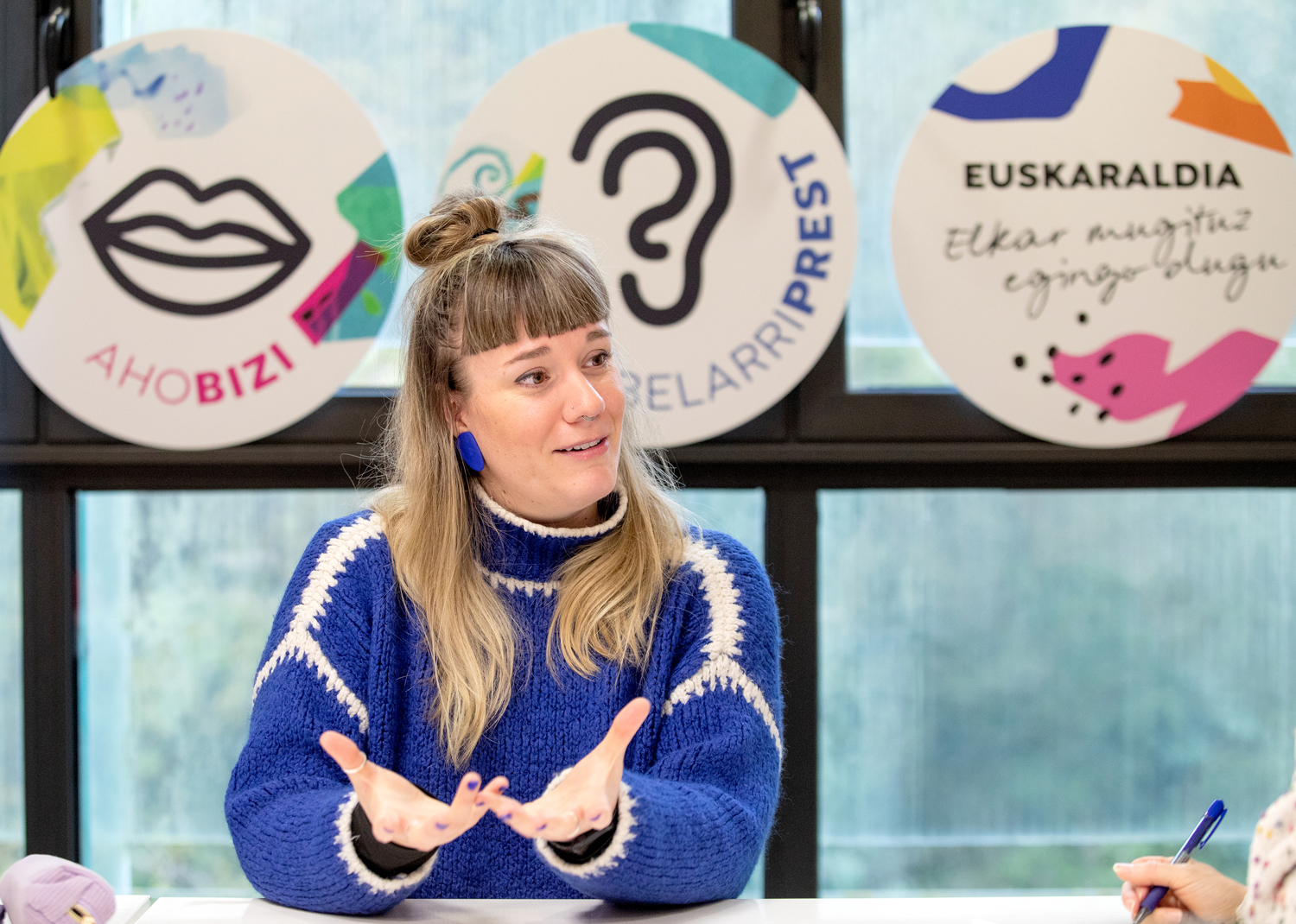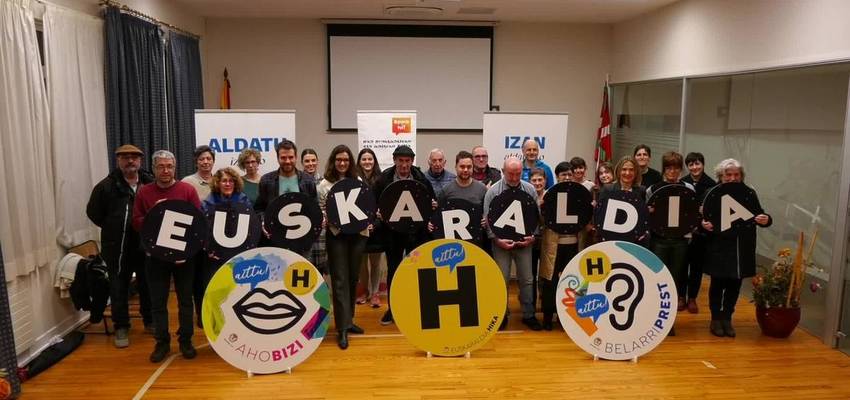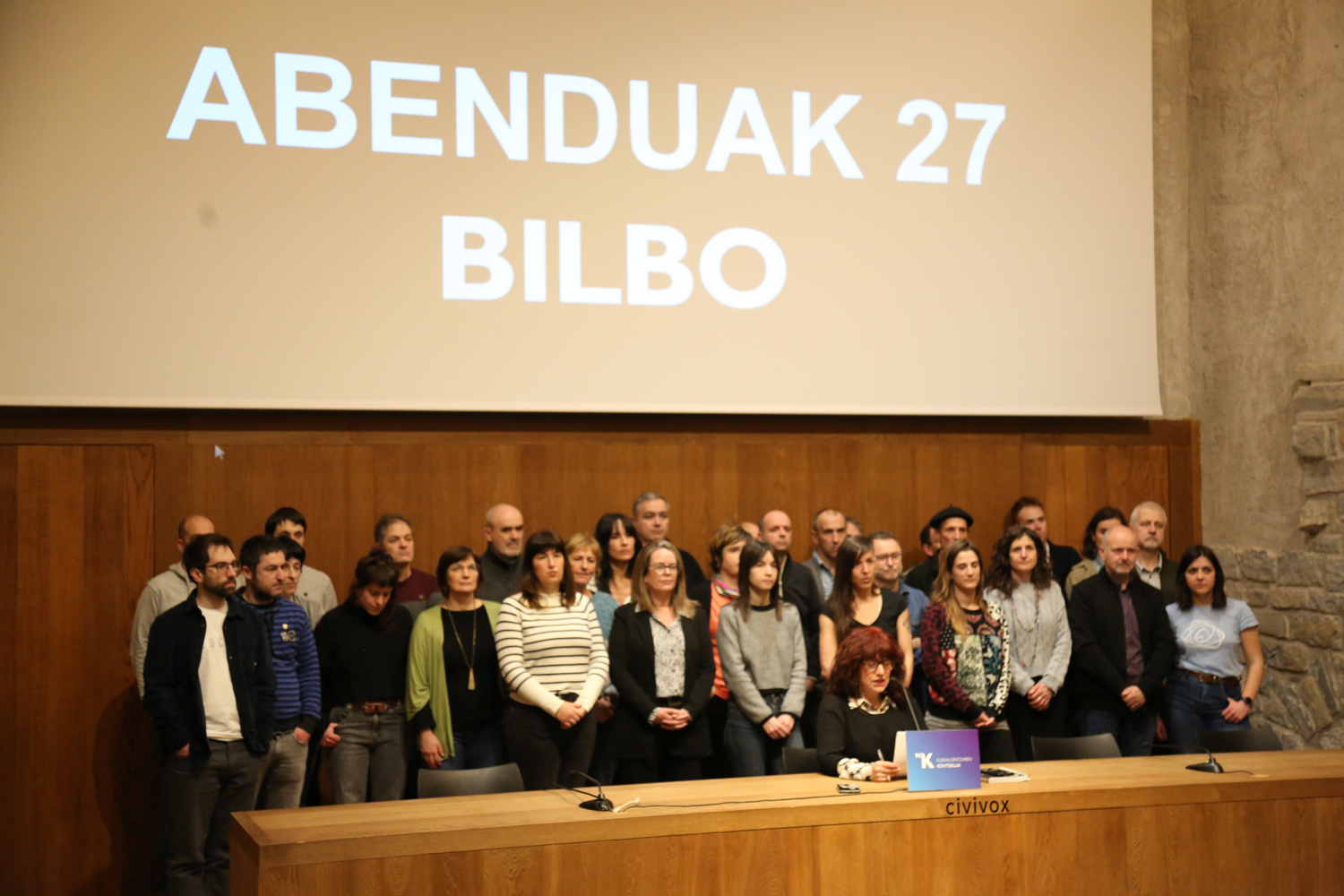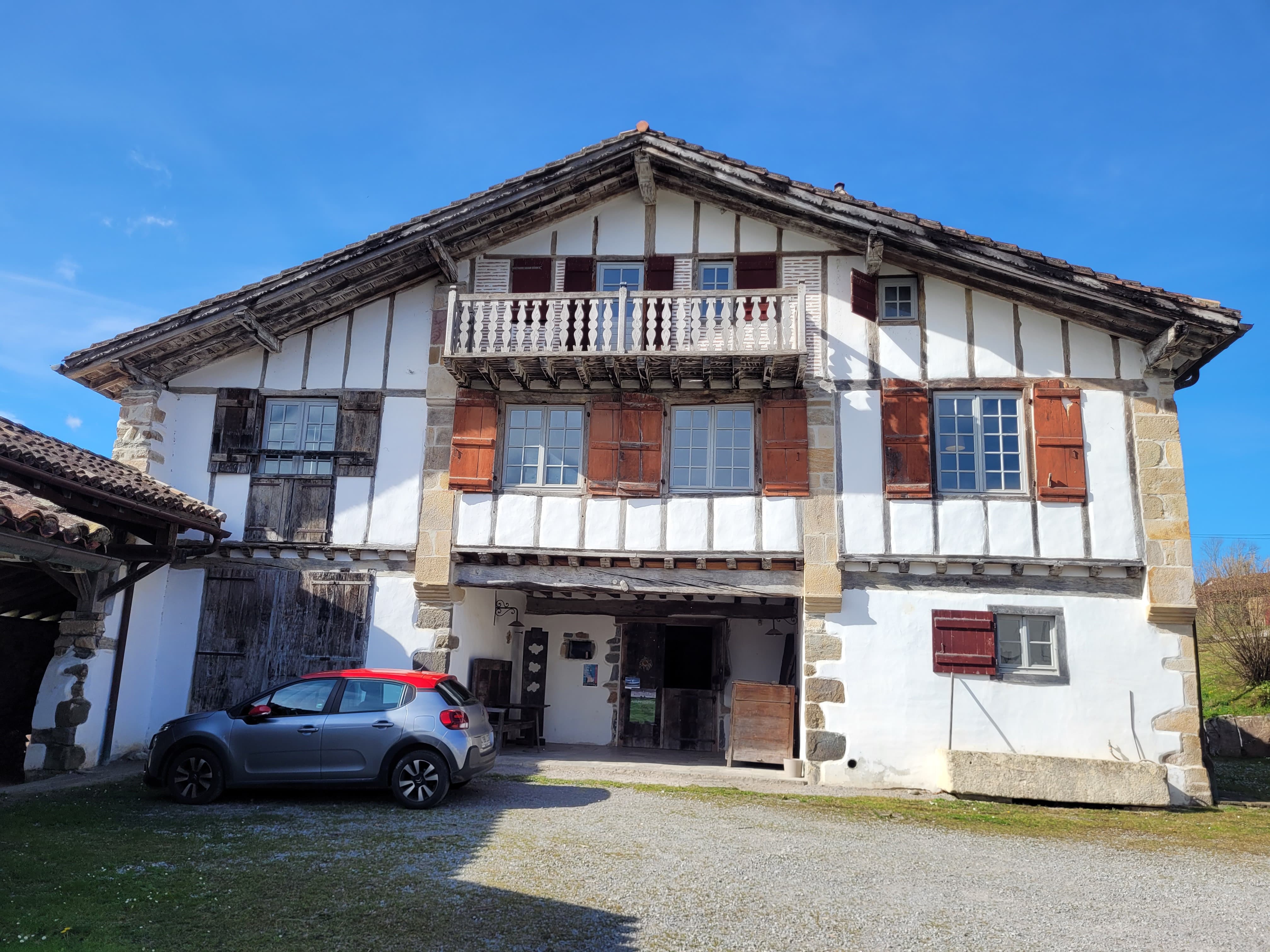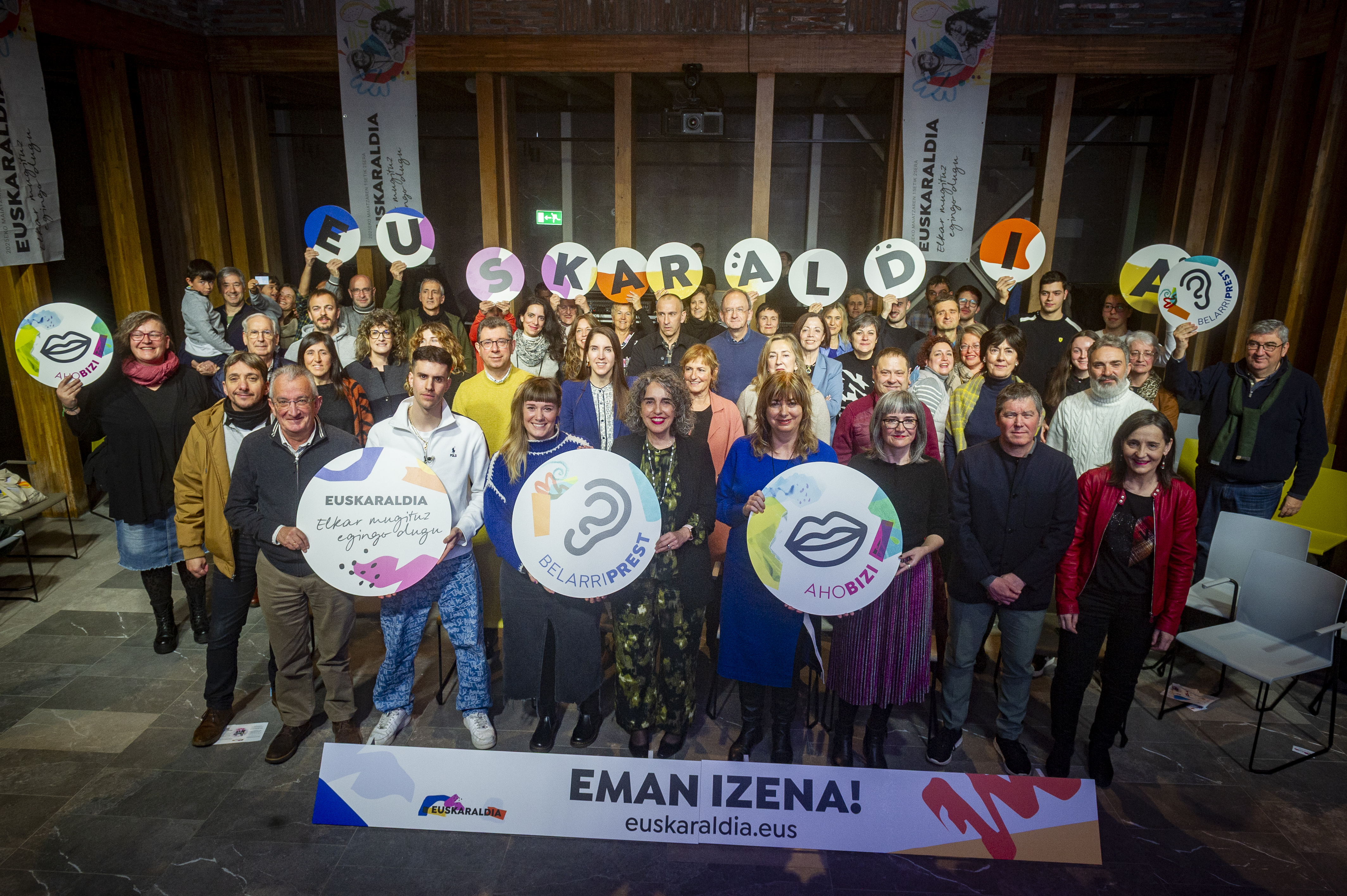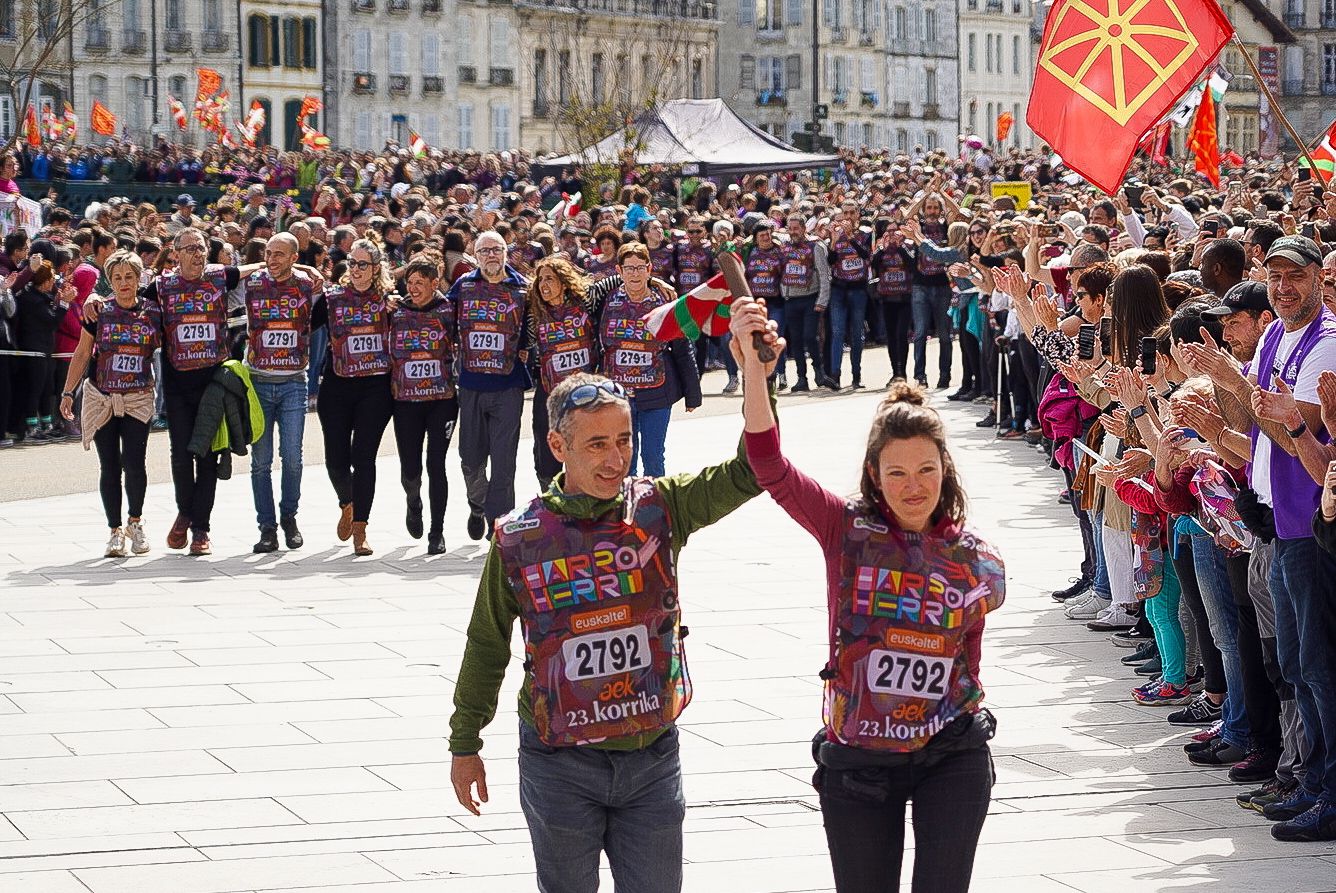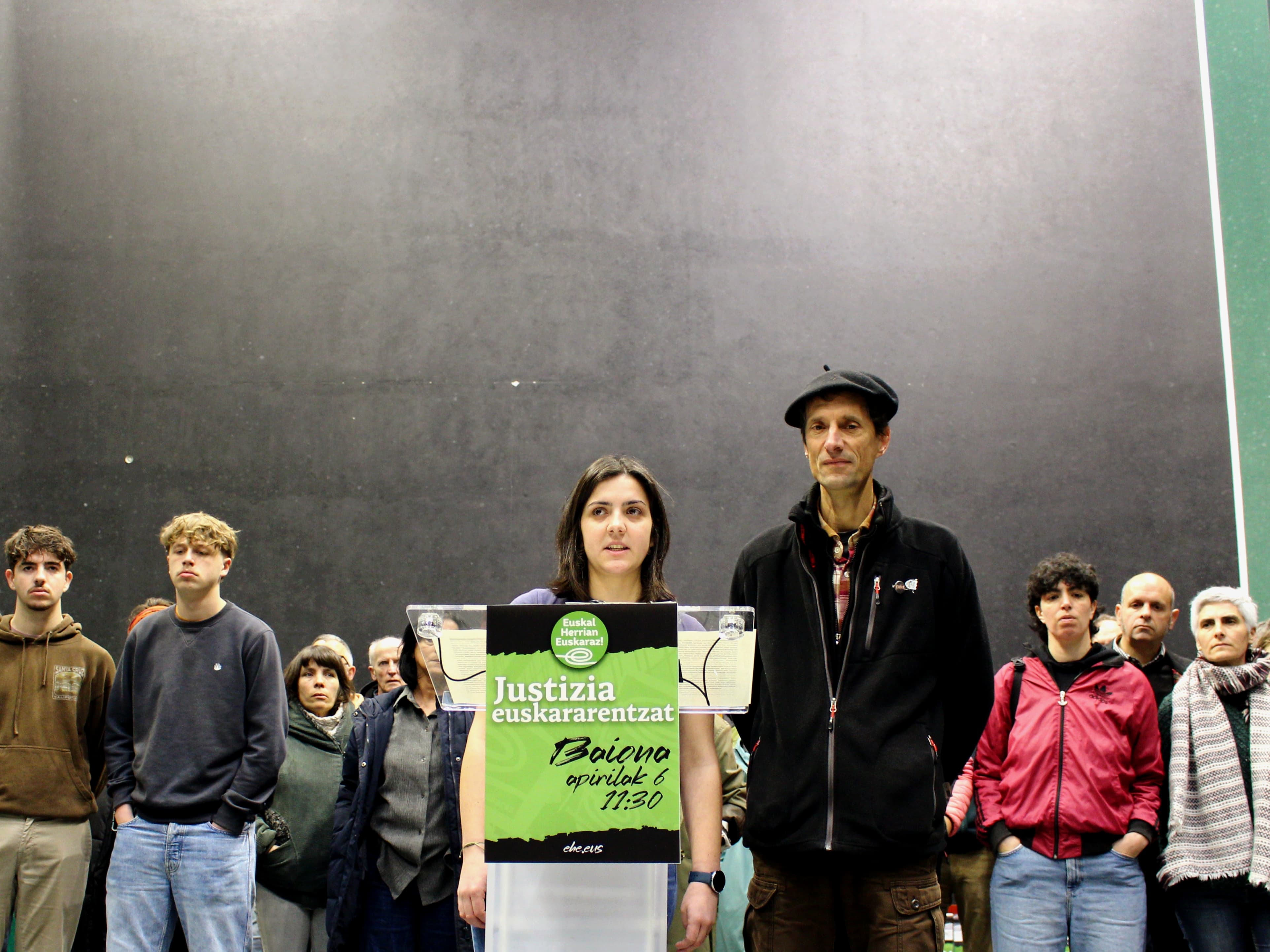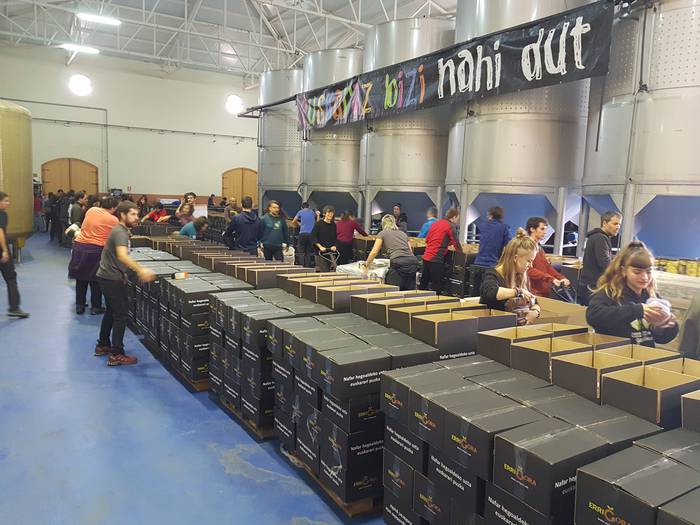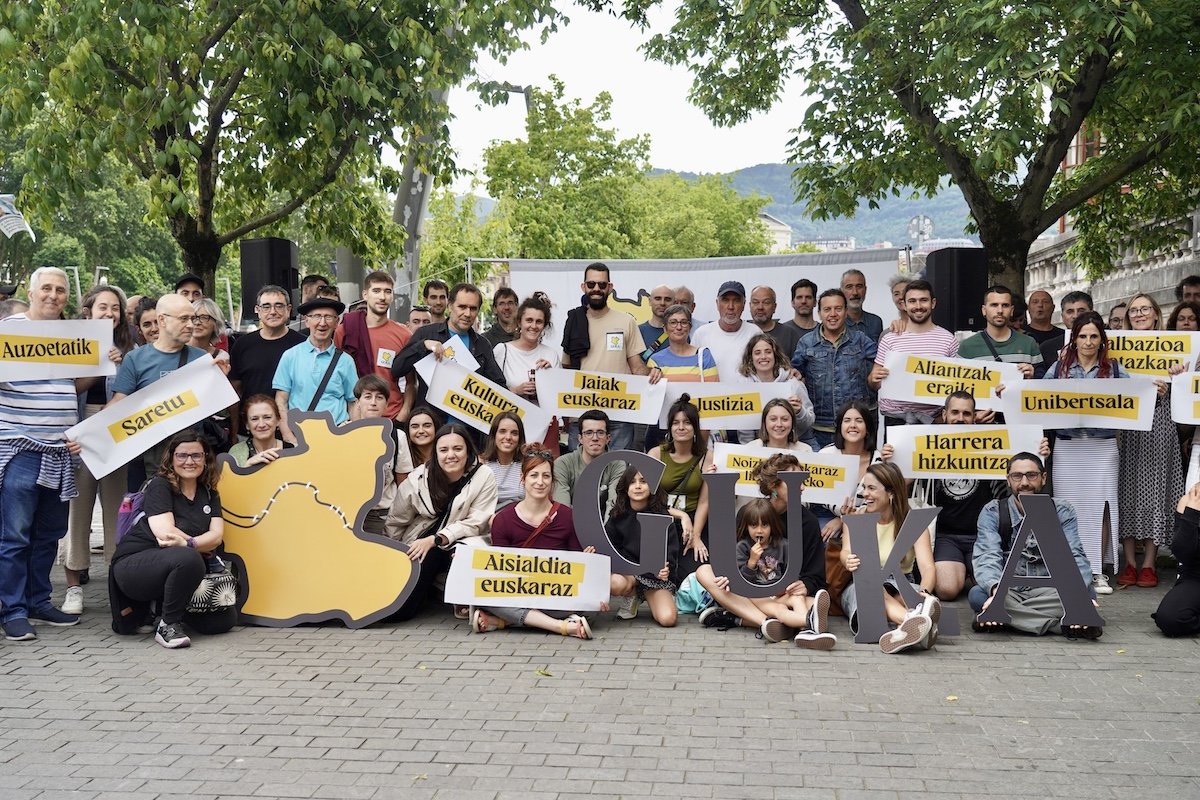From claiming the newspaper in Basque to do
- 25 years ago, on December 6, the first issue of Euskaldunon Egunkaria saw the light. It was thanks to the sweat and contributions of many citizens. How did it come, but people were about to disappear to gather around ARGIA, strengthen it and decide that in a few years they would do a newspaper entirely in Euskera, street or whale? What fire moved them?
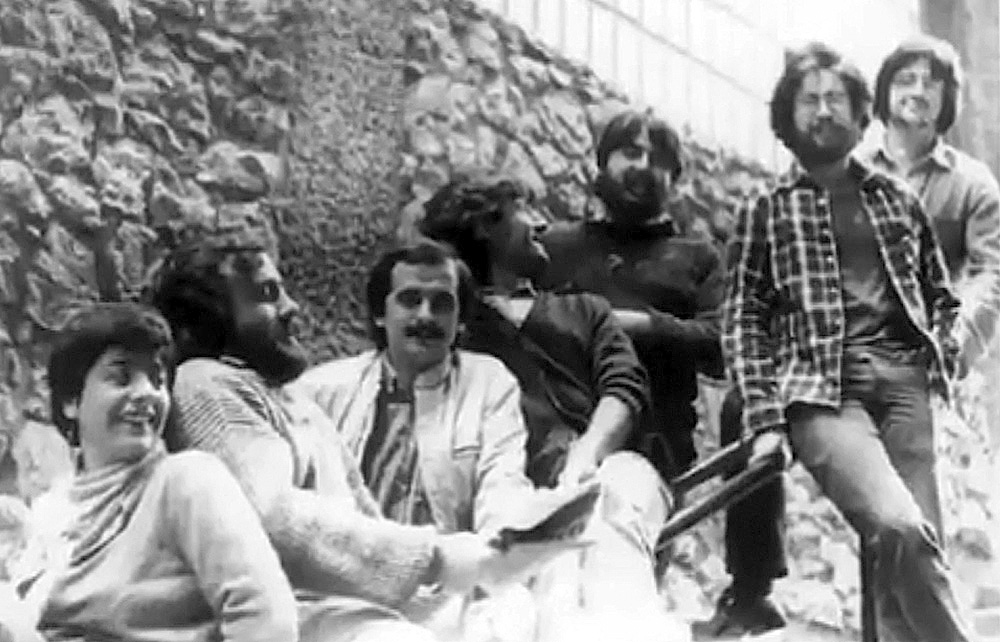
“We were a young team, most of us had no family, so no compromise, and we spent the day there. At the Kata bar in the Donostia district of Egia we ate breakfast, ate and often dine.” They are words of Pello Zubiria. “In the 1980s, we put all the infrastructure and knowledge that we accumulated in ARGIA to push Egunkaria forward.” In order to understand the creation of Euskaldunon Egunkaria, one must know the path taken between the nucleus that the Basque press engine in ARGIA carried out throughout the decade.
Joxe Mari Ostolaza was from 1977-78 when the magazine was still called Zeruko Argia and was in the hands of the Capuchins. Baleren Bakaikoa went to Ziburu. From an entrepreneurial point of view, it was very bad, as half of the recipients paid and could not maintain the structure. “Baleren wanted someone who didn’t live out there, but put on it.” Then Ostolaza stood. The Capuchins wanted to leave it and he, along with other employees, wanted to buy it.
Joxemi Zumalabe worked in a photocompositional company in Egia. The Light of Heaven was where the first impressions were produced. Ostolaza suggested that he go to the magazine to do the same work. Zumalabek nodded, and in the fall of 1980, at last, from Zeruko Argia to ARGIA, only Zumalabe and Ostolaza passed, taking a step back from the other comrades. The picture was hard. They were left with a debt of 8 million pesetas and no destination. They were indebted to friends in the area and started looking for new people.
 “It was a desert. We were bankrupt, we had even run out of the money to buy paper. Then the young Josu Landa, Pello Zubiria, Iñaki Uria and Jon Barandiaran entered with strength, so we went overcoming the problems by becoming a group and always feeling a great loneliness on the road of the years in the cry of the press entirely in Basque.”
“It was a desert. We were bankrupt, we had even run out of the money to buy paper. Then the young Josu Landa, Pello Zubiria, Iñaki Uria and Jon Barandiaran entered with strength, so we went overcoming the problems by becoming a group and always feeling a great loneliness on the road of the years in the cry of the press entirely in Basque.”
Josu Landa describes the work in ARGIA as “numantino” in the book Ipurtargiak luzea by Lorea Agirre. “Being together, spending the night, sharing the money, thinking ‘all my stuff is yours and vice versa’ ended up creating a very rich human and affective environment.” According to the data collected in the book, only twenty-four numbers were published in 1981. However, people began to gather around them: Pablo Sastre, Joseba Álvarez...
Bilingual debates
The Castilian speaking press continued to have absolute leadership in the market. “In the so-called bilingual press, perhaps Euskera was used more than it was now when it was created. When Deia and Egin started with 10%-20%, and if in 1980 we had wondered how much Euskera is going to be used in these newspapers in the year 2000, nobody would have said it was less than 30%. In this sense, Josu Landa and Joxemi Zumalabe, among others, were good theorists of the creation of purely Euskaldunes structures. We realized they were right. Collaboration structures and networks must be created that work in Euskera,” says Pello Zubiria.
“We always had to defend ourselves because we wanted to make an entire weekly in Euskera,” says Zubiria. “If you do the newspaper in Spanish and some parts in Euskera, you’re condemning Iparralde; it’s amazing how there is no debate on this issue. For us it was a scandal that the Abertzale left made a newspaper and that Iparralde remained that way,” says Ostolaza, acknowledging later that for years they have had tensions with some sectors of the Abertzale left over the way of dealing with Iparralde’s information.
Assume the process and create companies

The philosophy has been to build a corporate structure around ARGIA. “Jobs that affect our main activities to make them other companies that stay and that, at the same time, support what is central,” said Pello Zubiria.
“When we started at ARGIA, the process needed 15 days until we finished the magazine and got home,” says Iñaki Uria. “Instead of making the photocomposition outside, we started doing it at home. With this we gained speed and became aware of the process.”
“The time to think seriously about the newspaper came quite quickly, without the companies being consolidated, we were taking steps, as the people who were going to be in them were on top.” Juanjo de Marcos Poco and Simeon Barroso Sime made great prowess. They met them in Egin and took on the challenge of implementing a computer system in ARGIA. The machines were really able to fix them, and the anecdotes that the new generations of ARGIA often hear are the ones that discovered the computer chips burned by Sime and Little by smell and licking.
Two discarded photocomposites were bought in a large newspaper in Madrid and made a round play. One of them sells more expensive and the other for ARGIA debal. “By then we already had a very powerful photocomposition, the management of subscriptions also very well computerized, as Josu Landa manually introduced data from the thousands of subscribers,” he recalls.
After more operations and works of this kind, in a few years the bankrupt journal would be strengthened and companies created in the area: Apika in informatics and Antza in graphic design.

Ostolaza speaks with rigor. “We were clear that we wanted to make a standardised press in Basque. There was a dream and a strong team.” To carry out their lives, some worked as teachers or translators, others collaborated in Egin. They started to see that they were technically more advanced than the mainstream media, like when they started working with the floppy disks. “We were much poorer, we charged much less than them, we were from a cottage comparing almost the residences, but we were well advanced technically. That seems like a big advantage,” says Zubiria.
“We had everything we needed to do a newspaper, and that led us to conclude that it was possible to do so in 1988-89. And after that, 'we'll do it,' says Uria.
“Josu Landa’s thing is truly remarkable, he learned everything in a short time: dialogue, record, photograph, reveal, photocopy if it had to be done, and even cast it in the printing press.” Ostolaza is convinced that Egunkaria was impossible without Landa. “Josu was not only key, but indispensable.”
“I started in ARGIA a year before Antza was created, I was going two days a week to help me to itch texts.” Maite Gil, who was then 26, is thrilled to start talking about it. I was learning Euskera and meeting a totally Euskaldun environment was a perfect place to start talking. “I felt great, we were all one, doing what had to be done and there was an amazing atmosphere. I will never forget the welcome they gave me.”
You could make a newspaper.
Workers started to collect, social security contributions, informal debts became formal credits. ARGIA counted around 40 people, including Antza and Apika. They started doing days to reach people. Between 60 and 100 villages, on the same day ARGIA promotion tables were set up, reaching more than 300 in 1987, with the collaboration of different popular movements of the Basque culture: AEK, EHE, associations and Basque groups of the peoples... In 1988 they took advantage of the Argia Eguna to make public the need for a Basque newspaper.

“This ability to use all the resources of the environment was what made LIGHT strong and that is what is always out of history,” says Zubiria.
Xabier Letona is one of the first generations to study journalism in Basque at university. He started collaborating in ARGIA in early 1988 with Laura Mintegi, Pello Urzelai, Antton Azkargorta, Imanol Murua, Luistxo Fernández, Jon Sarasua, Jesus Artetxe and others. “At first we didn’t know much about these big projects, we lived in Bilbao.” He recalls that at that time it was a great confrontation in the Basque world. These are the times prior to the publication of the ikastolas, the first years of autonomy. “On the one hand there was the institutional world, with great strength on the part of the PNV; and on the other, the popular movements of the Basque Country, where the Abertzale left had strength. The Basque Government and the Basque Culture Assembly (CVV) were confronted.”
Throughout the 1980s, the demand for a full newspaper in Euskera was repeated. Joxemi Zumalabe also wrote in 1986 a project for a call from the Basque Government, but it was rejected by decision of Egin and Deia, which was granted a grant for the placement of a supplement in Euskera. “When the aid was over, those supplements disappeared, we are still there,” says Ostolaza. There were many articles, conferences and round tables where ARGIA was the engine.
Iñaki Uria recalls that the decision to make Egunkaria was a process. “By the end of the decade we saw that we were begging but it was useless, that they made excuses: that there are no readers, when we know there are; that there are no journalists when we know that well-prepared young people are leaving university, and a long and so on.” In those years, they dedicated themselves to socializing the discourse argued in favor of the Basque newspaper.

The cry of Egunkaria Sortzen
“In ARGIA we could not do it alone, we would help to assemble, but there was a need for another coalition,” says Zubiria. The project came from ARGIA, but in order to move forward, it had to make its own way. That was reflected in the philosophy and administration council of Egunkaria Sortzen.
The revenue was huge. The shares, amounting to 50,000 pesetas, were sold in lots. They also sold 500.000 shares, looking for entrepreneurs with special sensitivity to the Basque world and going to them. There was a great movement in all the peoples. Asked about people's response, Pello rounded off like this: “Many collaborated, some always collaborate, others never help.”
Other Government newspaper
“It wasn’t an idea, it was something we had to do,” says Ostolaza. “These were problems when the Basque Government began to sabotage us, led by José Ramón Beloki and Joseba Arrangi. In the government they realized that we were serious and that we were going to do Egunkaria, and then we were put on the other side. Because they had public money, they didn't need customers, because they wanted to distribute for free to the ikastolas and abort our project. The project was not to obtain for the Basque people the structures that the Castilian ones had, some had in mind a business”. Ostolaza recalls in a particularly painful way that the Ikastolas Federation came to this project together with others, and that it not only passed on to another project, but, in its opinion, actively opposed it. “Others too. Loneliness has always accompanied us, determination as well.”
“Arrangi doesn’t support anything he doesn’t control,” Joxemi Zumalabe wrote in the unfinished article, according to Lorea Agirre. Iñaki Uria reminds you of this: "Society was the one that opened the door to the creation of a public newspaper, which pushed back some sectors when it came to putting money, especially the most profitable sectors. That’s where we got a lot of damage.”
Uria has recalled a press conference, showing the situation, that the Basque Government did on the eve of the birth of Egunkaria to announce its newsletter. “I left and I couldn’t believe. They said that the newspaper was a matter of propaganda and that we would not. And we were going to take it out in two days.”
Crazy years
Iñaki Uria remembers that they worked and worked for years. “The years before and after the newspaper was created were very hard, very laborious.” Meetings of the CVCE began at the end of 1989 and the following year: Meetings in Durango, first meetings of Egunkaria Sortzen in January 1990 to design the project, motor group, economic team and journalism team; in spring approve the project and create the company, organize the campaign from May 15 to July 15, organizing a festival in the velodrome with number 0; organize training courses for journalists at the ARGIA headquarters in Mundaiz, search and organize in parallel. “Imagine what madness.”

The numerous numbers 0 left before having a definitive location. He was apparently in Donostia on the Mundaiz Walk, “getting into an ark, in the printing press that once was Tamayo,” says Zubiria. “You would have to see what that was. The structure and the floor were made of wood, at least 100 years old in the pavilion, and on the computers that piled up there a lot of people coming back to work as ants. All this with the smell of a printing press, under which ARGIA and commercial works were published. There are some Christian experiences.”
“Although we didn’t live there, we were very professional. There was a very powerful network, and for example, those who wanted to write poetry, Mikel Antza, Eneko Olasagasti and they did it through Josu in Susa, but also the dirty work in ARGIA,” says Ostolaza.
“Euskera was the axis, with a left-wing vision and practice in the national construction. That was the engine,” says Ostolaza. “Unfortunately, there is no talk of left-wing practices in the business world, there is talk of objectives and there is talk of other things. But the goals must be in the media. Saying no, do,” Zubiria believes.

Contributions from the newspaper: Nationality, Style Book
The newspaper made numerous contributions in the field of Basque culture and popular action. The project was defined by eleven points: vascophilous, national, unitary, broad, independent of the political parties, independent of the Spanish media, non-institutional, subsidized by the institutions, militant and new.
“With the Book of Style, a new national vision became a daily reality. Maps all over the Basque Country or data from the seven territories that are today normal, but that began then. Until then, even in the Abertzales, there was a new vision of the world, of the States. We, outside the Euskal Herria section, create the foreigner or the world,” says Iñaki Uria. Consistent with that, Egunkaria opened its offices in Baiona and Pamplona, although it is known that, without that investment, it is likely to go ahead. But it was strategic.
“How it was written: Cambodia or Cambodia?” –Zubiria- asks, each one wrote according to intuition. Many of them worked very well on this. The programme team shall consist of Koldo Izagirre, Koro Zumalabe, Etxeberria Malores, Luistxo Fernandez. Then came the rules of Huzei and Euskaltzaindia.”
Would ARGIA hold it?

The Weekly became very weak again. “This ARGIA group puts everything it has to take out Egunkaria, including our homes that are under warranty. We were afraid to bring the LIGHT into the hole, but it was private. Some of us were clear that the weekly was also going to continue, that it couldn't go away. In all languages there is everything, and we didn’t get there, but we kept in mind that the Basque Country needed it.”
“There came all our knowledge, our customer lists and everything we knew to go looking for shareholders,” says Pello Zubiria. Thus, on December 6, Egunkaria came out, on the front page with the first announcements of the Durango Fair and the war in Kuwait.
“It was crazy, a tremendous illusion. It was seen that having a newspaper in Euskera was amazing,” said Xabier Letona, who was 24 years old. “With a time perspective, I see that we didn’t realize what was ahead of us in ARGIA. Almost all the workers went from one day to the next to Egunkaria and we remained in a very weak position in ARGIA. We were young people, few partners... the need to face the company and look again for our journalistic place.” Garbine Ubeda as director, Juan José Petrikorena, Iñigo Makazaga, Xabier Letona and Pablo Sastre stayed with the veteran band and gradually more people reached the top.
Denture of the challenge
“Do you have a project or don’t have it? If you are the project, you don’t tidy me,” Ostolaza gets angry, looking back. “In ARGIA, no one has put themselves ahead of anything. We formed a very solid crew. And we had a little talent, plus strength. That continues, because it is no coincidence that in ARGIA you are still there, and from that group came the editorial Susa, for example, that he is still there fulfilling his role. And all of that we did without a miserable euro.”
The designer Maite Gil summarizes the creation of the Journal: “People did a great job; now yes, they went ahead in the spirit of ARGIA. There was ARGIA and that should not be forgotten, because now it is only easy to say that we have a newspaper in Euskera, but who moved to push it forward? Josu, Pello, Iñaki, Ostolaza, Zumalabe and others. It was a group of Kriston and at the time Egunkaria was made because they gave it everything.”
“There are seasonal people and the challenge is made a bite of taste.” In an interview held the week after the creation of Egunkaria, Pello Zubiria affirmed this in ARGIA. He was appointed first director, although on many occasions he stressed that he did not have to be initially director, that he had not been a principal agent, but one of many.
The newsletter in Basque had to live the difficult months. Among other things, Egunkaria was unable to obtain the subsidies, without taking into account from the institutions its work in the normalization of the Basque Country. They also remember what they were unable to achieve or talk to the Member of Bizkaia, Alberto Pradera. The years that elapsed until a normalized relationship with the Basque Government was achieved would deserve another report. Zubiria reminds Martin Ugalde as an anecdote, to whom the lehendakari José Antonio Ardanza was imposed when he went to present the newly created Journal of Ajuria-Eneara.
Sad epilogue
After a fruitful career throughout the Basque Country, Euskaldunon Egunkaria was closed in 2003 by the judge of the National Audience Juan del olmo, who closed it. Many of the detainees were tortured. The 2010 judgment showed that both closure and detention had no basis in the judgment.

“Some of us have said publicly that we do not accept that this is closed. Do you close what they have had to build so hard, then leave without the slightest guilt and the Journal is closed? That’s very hard, it’s not acceptable.”
“The most important lesson is that what seemed impossible was done. They saw that it was possible and mentally they were well advanced,” says Xabier Letona. "We go from claiming to doing," that's the key, according to Iñaki Uria.
“They did us and closed the newspaper to us, but nothing happens here. That's right, who's going to do it: but what do you do who's taken so much work and risk in the project? How do you fix it? However, we did it at ease. And without repentance,” Ostolaza concludes. Today, seeing that ARGIA is still alive, when Ostolaza returns to the writing shouting “What a beauty!”
Bilbon eginiko aurkezpenean iragarri dute ekitaldia, euskarari "arnas berri bat emateko eta behar duen indarraldia gorpuzten hasteko" lehen urratsa izango dela nabarmenduta. Euskaltzale guztiei, baina, oro har, "justizia sozialean eta gizarte kohesioan aurre... [+]
Euskaraldiaren hamaikakoa aurkeztu dute Nafarroan: Julio Soto bertsolaria, Edurne Pena aktorea, Julen Goldarazena musikaria (Flakofonki), Claudia Rodriguez Goxuan Saltsan taldeko abeslaria, Eneko Garcia (Albina Stardust), Yasmine Khris Maansri itzultzaile eta kazetaria,... [+]
Euskalgintzak Senpereko Larraldea etxea faltan botako du. Uda gabe, Bertsularien lagunak, bertan gelditzen den azken elkarteak, lekuz aldatuko du eta etxea hetsiko dute. Euskararen, euskal kulturaren eta arteen ohantzea izan da Larraldea, urte luzetan Andoni Iturrioz mezenasak... [+]
Horra Libération egunkariak berriki argitaratu duen idazkia:
“Bayonne” bukatu da, Libérationek “Baiona” idatziko du
Hiri baten izenaren erabilpena ohiturazkoa delarik, egunkari batean izen horren erabilpena aldatzea zaila da. Alta, irakurleen... [+]
Gasteizen egin duten ekitaldian ireki dute izen ematea, laugarren edizioa hasteko bi hilabete falta direla. Erakundeetako ordezkariak, herritarrak eta entitateetako kideak agertu dira, besteak beste. Euskaraldiaren koordinazioa Euskal Herriko erakunde publikoen eta Taupa... [+]
Korrikaren "bihotza eta burua" erakutsiko ditu dokumentalak. Proiektua gauzatzeko, herritarren babesa "ezinbestekoa" izango dela adierazi dute AEK eta Mirokutana ekoiztetxeak, eta apirilaren 25era bitartean crowdfunding kanpaina bat abiatuko dute jalgihadi.eus... [+]
25 bat eragilek adierazi diete elkartasuna apirilaren 11n Baionako auzitegian epaituko dituzten Intza Gurrutxaga eta Gorka Torre Euskal Herrian Euskaraz taldeko kideei. Egun batzuk lehenago, apirilaren 6an Baionan eginen den manifestazioan parte hartzeko deia ere luzatu dute.
Martxoaren 10etik 26ra izango da udaberriko kanpaina. 'Beste modura, denona de onura' lelopean arituko dira gertuko ekoizpena, banaketa eta kontsumoa babestu eta sustatzeko, ager zonaldean euskara hauspotzen duten bitartean. Apirila amaieratik aurrera jasoko dira... [+]
Otsailaren 28an Hendaian eman dio hasiera kanpainari Herri Urratsek. Euskararen transmisioa bermatzen duen Seaska babestea da helburua.
Gukak “Bilbo erdalduntzen duen makina” ikusaraziko du kanpainaren bidez. 24 orduz martxan dagoen makina salatuko dute, eta berori “elikatu eta olioztatzen dutenek” ardurak hartzea eskatuko dute. Euskararen aldeko mekanismoak aktibatzea aldarrikatuko dute.
Hamahiru ZirHika kide batu dira hitanoaren erabilera aldarrikatzeko eta antolakundearen ekintzen berri emateko. Azalpenak Badihardugu elkarteko Idoia Etxeberria eta Galtzaundiko Uxoa Elustondok egin dituzte. Horiei, Andoni Egaña eta Amaia Agirre bertsolariak eta... [+]









